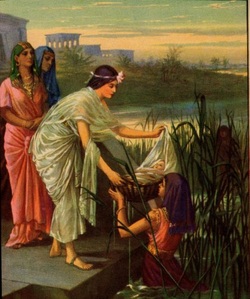
I wonder why. Why would a daughter of the mighty Pharaoh risk her status and her life by going against her father's decree? What did she have to gain by adopting a Hebrew slave? Did she yearn for a child of her own? Was it a rebellion against her father? Was it purely an act to save a life?
Pharaoh's daughter is regarded very positively by the rabbis. She is considered a woman who chose the path of righteousness against the sinful path of her father. In some regards, she is the epitome of the righteous gentile who saves the life of a Jew at great personal risk.
It is also possible that the character of Pharaoh's daughter in the Torah was inspired by another Pharaoh's daughter who is described much later in the Hebrew Bible. According to the Book of Kings, King Solomon married a daughter of Pharaoh, the king of Egypt. She became Solomon's wife (one of seven hundred) when Pharaoh gave her to him, apparently in an act of appeasement after an ill-fated Egyptian military expedition against the Canaanite city of Gezer (I Kings 9). The editors of the book of Exodus may have had Solomon's wife in mind when they described the kind-hearted daughter of Pharaoh who recognized the child of a Hebrew slave, rescued him, and took him for her own.
We, too, can recognize Pharaoh's daughter in our own world. We, too, have seen non-Jews who choose to raise Jewish children to be their own and who nurture within them a love of Judaism and the Jewish people.
In the congregations I have served, I have seen many non-Jewish spouses who make the loving choice to honor the religious tradition of their husbands and wives by raising children in our faith. I have seen these non-Jewish men and women joyfully drive their children to Hebrew school, volunteer in the synagogue, and love their adopted communities.
For a very long time, Jews tended to look askance at the non-Jewish spouses of intermarriage, as if they were the cause of a stain against our people. That has to end. Rather, we should look at these men and women the way we look at Pharaoh's daughter. They are shining examples of dedication and, sometimes, also of sacrifice.
The next time you hear a fellow Jew speak harshly of a "shiksa" or speak pejoratively of a non-Jewish man who has married a Jew, remember Pharaoh's daughter. Remember our debt to the people who choose to help raise the next generation of the Jewish people, even if it is not the people of their own faith.
Other Posts on This Theme:
Missing Pieces
How Does a Joyful Jew Respond to "Merry Christmas"?

 RSS Feed
RSS Feed
